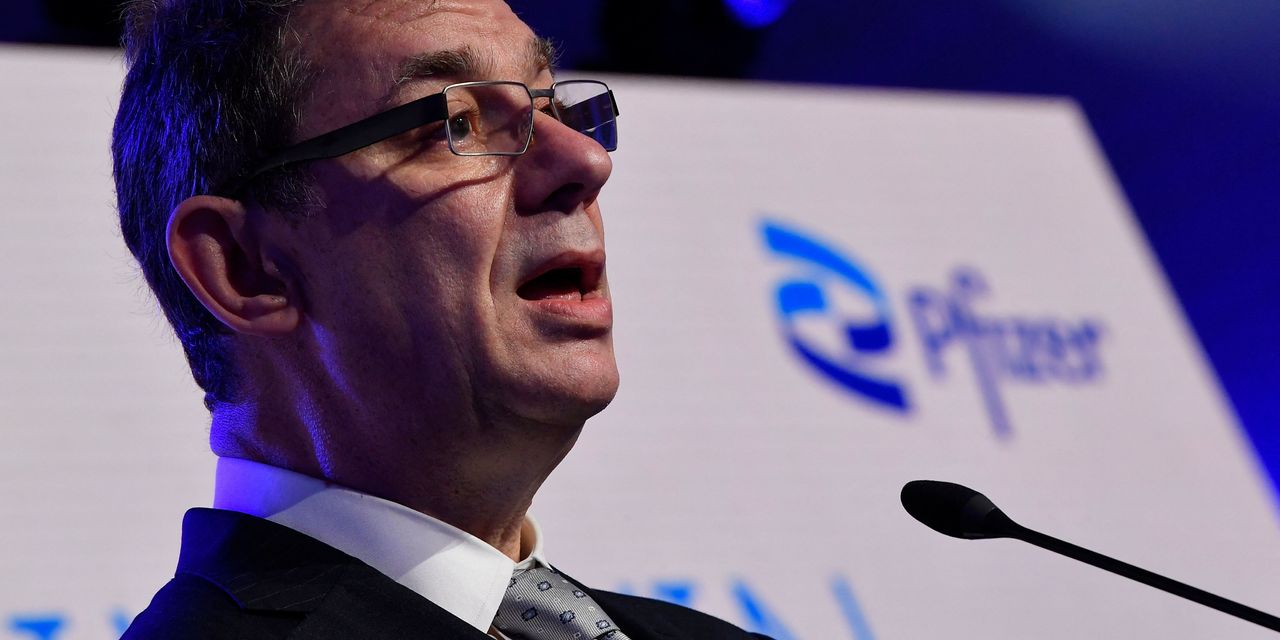Pfizer Inc.
PFE,
on Monday sought to reassure investors that it can slash costs to repair the damage done by underwhelming COVID-19 product sales.
On a call with analysts Monday morning, Pfizer executives outlined cost reductions first announced late Friday. The cost-cutting program, designed to deliver savings of at least $3.5 billion, “will touch all parts of the business and all regions,” Pfizer Chief Financial Officer Dave Denton said on the call. The program will have no impact on the company’s planned acquisition of Seagen Inc.
SGEN,
Denton said, which is still expected to close late this year or in early 2024.
The relatively low uptake of the latest COVID-19 vaccines, which hit the market in September, provides a good conservative baseline for estimating future vaccination rates, Pfizer executives suggested. “We are right now in the middle of COVID fatigue, where everyone wants to forget about the disease, and we are experiencing a peak of anti-vaccination rhetoric,” Pfizer CEO Dr. Albert Bourla said on the call. “Therefore we believe those who are getting vaccines and medicines in the current environment are people who believe in the value of protection and treatment and will continue this behavior in the years to come.”
The executives’ comments came after Pfizer late Friday slashed $9 billion from its full-year revenue guidance due to reduced COVID sales expectations, and said it now expects full-year adjusted earnings per share in the range of $1.45 to $1.65, versus $3.25 to $3.45 previously.
That news triggered some harsh assessments from analysts. Before the call Monday, BMO Capital Markets analyst Evan David Seigerman cut his price target for Pfizer shares to $33, from $44 previously, saying the “massive” guidance cut was desperately needed but may not be enough for management to regain credibility. “This is a pivotal moment in the post-COVID Pfizer narrative; management must seize it,” Seigerman wrote.
Pfizer executives expressed hope Monday that the combined respiratory vaccines in its pipeline, such as those that deliver protection from both COVID and flu in a single shot, could drive up vaccination rates in the future. Despite the planned reduction in operating expenses, “we’ll continue working particularly on combination vaccines,” Bourla said on the call. The combined shots, he said, “will help us enhance how easy and convenient it is for patients to receive protections for respiratory diseases, and that of course will potentially play a role in improving” vaccine uptake.
The company’s clarification Monday that 2024 net operating expenses would fall by $3.5 billion, before factoring in the Seagen acquisition, came as “a positive surprise,” Leerink Partners analyst David Risinger wrote in a research note. Risinger maintained a market-perform rating on Pfizer shares, “given uncertain long-term growth prospects.”
Investors seemed to take some short-term comfort in Pfizer’s update Monday morning, and the shares rebounded 5.4%. Pfizer’s stock is down 34.5% in the year to date, while the S&P 500
SPX
is up 14%.
The Pfizer news weighed on shares of other vaccine makers. Despite Moderna Inc.’s
MRNA,
statement Monday saying it remains comfortable with its existing COVID sales guidance, the company’s stock fell 6.7% Monday morning.
Read the full article here













Leave a Reply